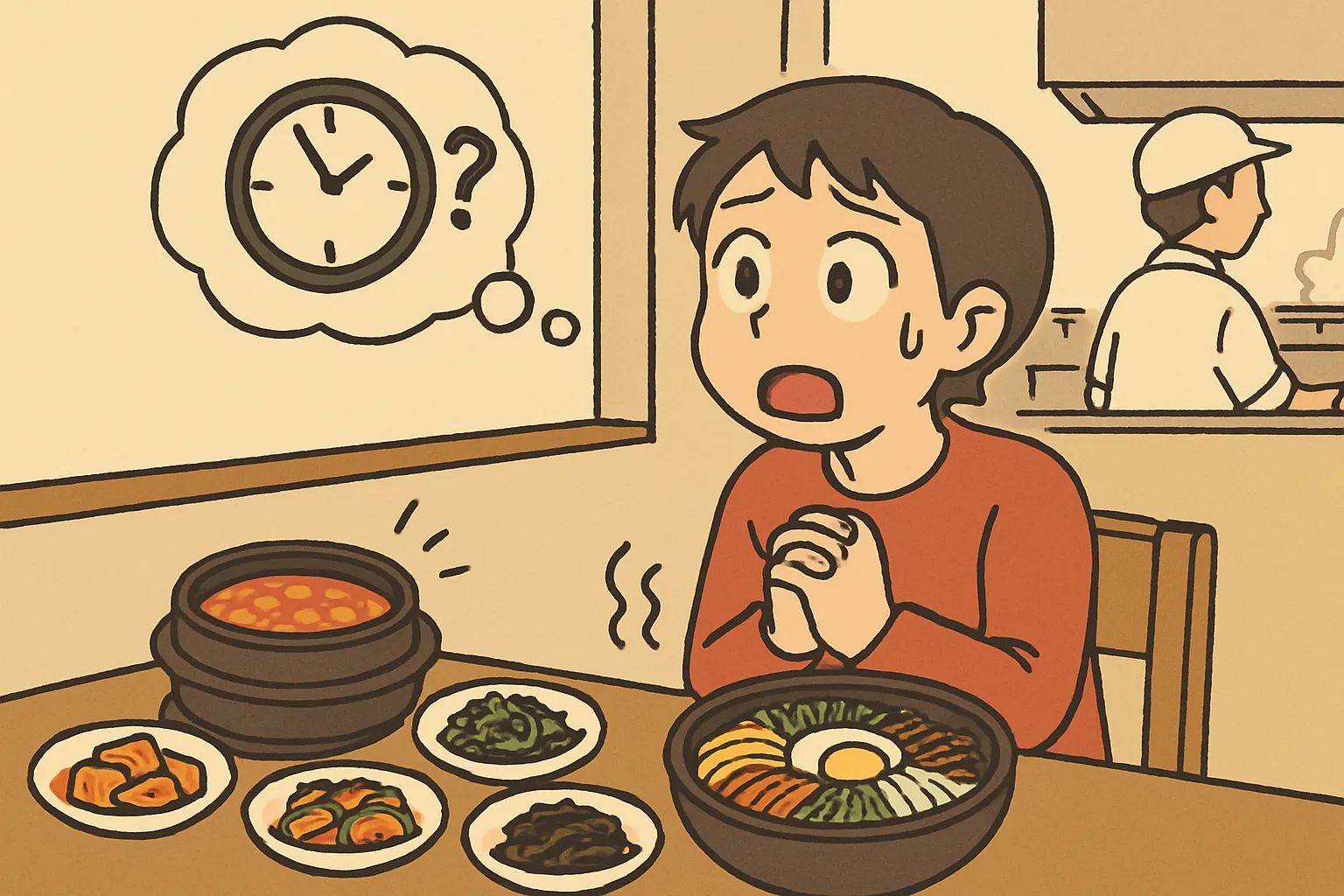Korea’s ‘Open Run’ Craze: How to Say ‘Let’s Wait a Bit’!
Hello! It’s your friendly guide at [Maeil Hangeul], here to upgrade your Korean skills!
Have you ever been waiting in a long line with a friend who’s about to give up? Or maybe you’re waiting for a bus that’s taking forever? Today, we’re going to learn the essential Korean phrases for suggesting, “Let’s wait just a little longer!”
This is super useful in Korea, especially with the recent “Open Run” (오픈런) trend! This is where people line up for hours before a store opens to get limited edition items or into a super popular pop-up store. If you ever find yourself in an “Open Run” for the latest K-pop merch or a famous bagel shop in Seoul, you’ll definitely need these phrases!
Key Expressions You Need to Know
Here are three simple but powerful expressions to master the art of waiting in Korean.
1. 조금만 더 기다려요 (Jogeum-man deo gidaryeoyo)
- Pronunciation: [Jo-geum-man duh gi-da-ryeo-yo]
- English Meaning: Let’s wait just a little longer.
- Detailed Explanation: This is the most classic and polite way to ask someone to wait a bit more. Let’s break it down:
- 조금 (jogeum): a little
- -만 (-man): a particle meaning “only” or “just”
- 더 (deo): more
- 기다려요 (gidaryeoyo): The polite form of “to wait” or “let’s wait.”
You can use this with friends, colleagues, or anyone you’re comfortable with.
2. 거의 다 왔어요 (Geoui da wasseoyo)
- Pronunciation: [Guh-eui da wass-uh-yo]
- English Meaning: We’re almost there. / It’s almost time.
- Detailed Explanation: This is a fantastic phrase for encouragement! Literally, it means “almost all has come,” but it’s used to say you’re very close to your destination or the end of a wait. It’s the perfect thing to say to your friend when you’re near the front of the line!
3. -(으)ㄹ까요? (-(eu)lkkayo?)
- Pronunciation: [-eul-kka-yo?]
- English Meaning: Shall we…? / Do you think…?
- Detailed Explanation: This is a super useful grammar pattern for making suggestions. You attach it to a verb stem. To ask “Shall we wait?”, you take the verb 기다리다 (gidarida), remove -다 (-da), and add -ㄹ까요? (-lkkayo?) because the stem ends in a vowel.
- 기다리다 → 기다리 + ㄹ까요? → 기다릴까요? (gidarilkkayo?) – “Shall we wait?”
Example Dialogue
Imagine two friends, A and B, are waiting in a long line for a famous bakery that recently went viral on Instagram.
A: 와, 사람이 너무 많아. 그냥 갈까?
(Wa, saram-i neomu mana. Geunyang galkka?)
(Wow, there are so many people. Should we just go?)
B: 안 돼! 조금만 더 기다려요. 저기 봐, 거의 다 왔어요!
(An dwae! Jogeum-man deo gidaryeoyo. Jeogi bwa, geoui da wasseoyo!)
(No way! Let’s wait just a little longer. Look over there, we’re almost there!)
A: 음… 알았어. 그럼 10분만 더 기다릴까요?
(Eum… arasseo. Geureom sip-bun-man deo gidarilkkayo?)
(Hmm… okay. Then shall we wait for just 10 more minutes?)
B: 좋아! 이 빵은 기다릴 가치가 있어!
(Joa! I ppang-eun gidaril gachi-ga isseo!)
(Sounds good! This bread is worth the wait!)
Culture Tip: The “Open Run” (오픈런) Phenomenon
In Korea, “patience is a virtue” takes on a whole new meaning with 오픈런 (Open Run). It’s a Konglish (Korean-style English) term combining “open” and “run,” meaning you literally run to a store as soon as it opens.
- Why do people do it? To buy limited-edition luxury goods, exclusive sneakers, K-pop idol merchandise, or to be the first to eat at a new, trendy restaurant featured in a K-drama.
- Modern Korean Culture: It’s a fascinating mix of Korea’s famous “ppalli-ppalli” (빨리빨리, hurry-hurry) culture and extreme patience. People want things now, and they’re willing to wait for hours to get them.
- On Social Media: If you succeed, you might post a picture with the caption “오픈런 성공!” (Open Run seong-gong!), meaning “Open Run success!”
So, if you see a huge line in Seoul, don’t be surprised. It might just be an “Open Run,” and now you have the perfect phrases to join in!
Let’s Practice!
Time to check what you’ve learned.
- Fill in the blank: Your friend wants to leave the line for the new aespa pop-up store. You see you’re close to the entrance. You say:
“____________! We’re almost there!” -
Make a sentence: How would you ask your friend, “Shall we wait for the subway?” using the
-(으)ㄹ까요?grammar? (The verb for “to wait for the subway” is 지하철을 기다리다).
Great job today! You’re one step closer to sounding like a native speaker.
Try making your own sentences in the comments below! Fighting! (파이팅!)






